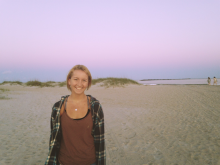My applied learning experience has consisted of working as a research assistant, having a directed individual study, and now my honors thesis project. I am currently working at CMS in my second semester of my honors project. I am working on analyzing a deep sea sediment core taken from the Labrador Sea. This includes microscopic picking of species of foraminifera for isotope analysis, grain size analysis using the camsizer, ice rafted debris counting, and mass spectrometer analysis. These analyses help to date layers of the core and overall, help reconstruct past ocean circulation patterns. This is important for understanding future climate patterns.
I got involved in this experience by working as a research assistant for my mentor, Dr. Sharon Hoffmann, in her laboratory at CMS on her research, and assisted her graduate student on her thesis project. This allowed me to gain laboratory skills in paleooceanography and begin my own project as a DIS. This individual study helped me develop my own honors project. I hope to be able to gain skills in working independently, and have the ability to write a publishable research thesis paper.
I gained laboratory skills necessary in my field of study. I have been experienced working independently in a lab and I have learned how to manage and schedule my time in order to complete processes in the lab, which is the most challenging part for me. I have learned how to operate the camsizer and mass spectrometer at CMS. I am currently learning how to write a thesis paper, and will be presenting it to a committee at the end of the semester. I will also learn how to make and present a poster of my work.
Developing laboratory skills, as well as learning how to operate machines such as the camsizer and mass spectrometer, and other computer programs to process data, make me a viable candidate for graduate programs in my field. Also, writing a thesis paper, and possibly having published work is a great way to stand out to graduate programs. In addition, this experience has also allowed me to make connections with professors in my field.





